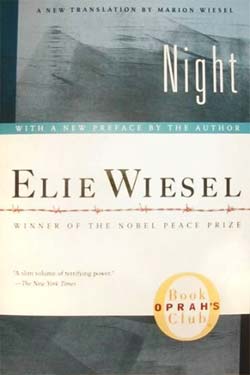Night

Night
By Elie Wiesel
See Oprah? I haven’t held a grudge about Gap Creek.
It seems a bit improper to be making a joke in a post about this book, but since I’m one of those people with the unfortunate habit of laughing or giggling when it’s REALLY inappropriate, I suppose it’s fitting.
I had actually never heard of this book until I was at Chapters the other night with my friend Hilary. She decided to buy this book by Douglas Coupland

– which I supported because I really want to read it too. Then we saw the display for Night, which she’d heard was very good. She talked me into buying it so that we could trade after we’d read them. I never need much convincing to buy a book, so I agreed.
This is a deceptively slim volume, translated from a book originally written in Yiddish. It is an autobiographical recounting of the author’s experience as a young teenager when he and his family were taken to Auschwitz concentration camp. The Holocaust is a tragedy of such enormity that it’s hard to get my head around. It just seems so impossible that people could have committed such acts of atrocity against one another. What makes the legacy of the Holocaust so terrifying is not the idea that people have the capacity for senseless hatred and cruelty, but that so many people were complicit in this. How can we ever make sense of that?
The Night looks at the Holocaust in the context of its impact on a single life. The author’s style is sparse but immensely powerful. Before his experience at Auschwitz – and the labour camps after that – the author was very religious. What I found most compelling about this book was the author’s struggle to reconcile his faith with his experiences. The horror of the camps made it impossible for him to continue to believe as he had before:
I did not fast. First of all, to please my father who had forbidden me to do
so. And then, there was no longer any reason for me to fast. I no
longer accepted God’s silence. As I swallowed my ration of soup, I turned
that act into a symbol of rebellion, of protest against Him.
And I nibbled on my crust of bread.
Deep inside me, I felt a great void opening.
The book’s message transcends religion and speaks to our faith in humanity: silence is unacceptable. We are each of us complicit when we do nothing when others are persecuted. This isn’t a pleasant book, and it shouldn’t be. I wasn’t even born when the Holocaust happened, but I nonetheless felt guilt reading this book. I think that we – all of us – ought to feel a collective guilt and shame that this was ever allowed to happen to even one person, let alone millions. For me this is what makes this book important and I’m glad that it is enjoying a resurgence in popularity nearly fifty years after it was first published. It’s dangerous for us to think of the Holocaust as something that happened in another time and place and could never happen again.
Night contains a very important message that we must never let ourselves forget.


3 Comments:
Wow. I already wanted to read this, now even more so. Very powerful review.
Glad you enjoyed Night. I used to teach it to my 10th grade World Literature classes, and they always found it very powerful. If it interested you, I might recommened The Golems of Gotham, by Thane Rosenbaum. Elie Wiesel makes a cameo in the novel while other Holocaust writers (Primo Levi, Paul Celan) have a central role.
Love your blog! Found my over here from Heather's place. :)
Your are Nice. And so is your site! Maybe you need some more pictures. Will return in the near future.
»
Post a Comment
<< Home